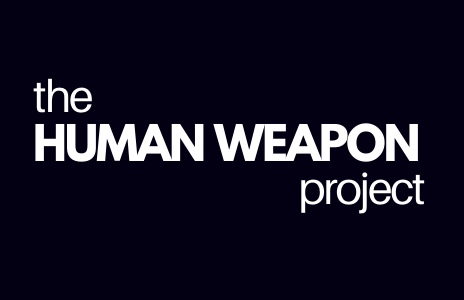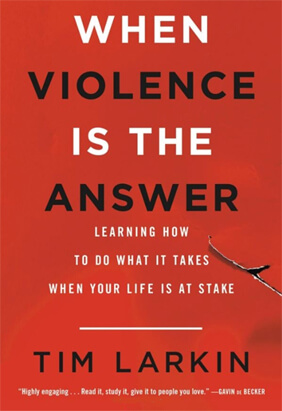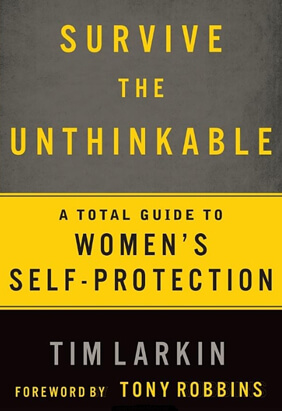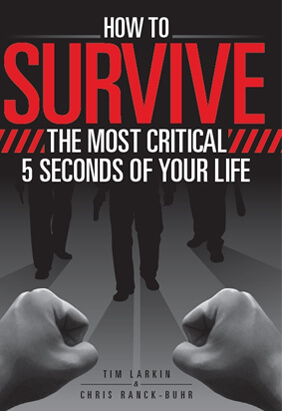- timlarkin
- how to obtain peace, training, training for violence, violence
THE SELF DEFENSE PARADOX: IF YOU WANT A TRULY PEACEFUL LIFE, THEN TRAIN VIOLENCE.
As an instructor I see myself purely as a technician in possession of certain technical information that may or may not be useful—that’s for the client to decide. I prefer this perspective as it’s simple and straightforward—I just want you to step in and do what you’re afraid he’s going to do to you.

To my mind, the technical information itself implies the rules of engagement, how to navigate the social ephemera, by virtue of the negative space: When all you have is a hammer, every face is glass. It’s obvious when it’s okay to shatter someone (when your life is on the line) and when it isn’t (pretty much all the rest of the time; maybe never).
Violence is nothing that should be un-holstered without ultimate cause, as it can’t be called back or its carnage undone any more than a bullet can be drawn back into a gun.
Of course, it turns out it’s not obvious. People naturally squint to fuzz the hard lines in order to assuage dented egos or to impress or intimidate—after all, what good is power if you don’t wield it?
I am continually perplexed by this thinking; it’s like flexing your swimming chops by diving into stupid situations—storm surf, flood water, jumping overboard fully-clothed five miles from shore at night—just to see if you can survive drowning.
No one in their right mind would do that. And anyone who would, will soon enough exceed their abilities in lethal fashion.
The real goal for all survival skills should be to roll the dice as few times as possible—not to see how many times you can get your lucky number to come up.
And so we make these mad preparations, thinking the unthinkable, training to do the worst things on the worst day of our lives, and for what? We want to make it back to the Good Stuff, alive and whole.
But none of it is any good if we let one color the other. Panic at what might be lost has no place in direct action, just as a constant undercurrent of fear will corrode ourselves and our relationships, both personal and to the wider world.
Do the war-stuff so you can have more of the peace-stuff—and perhaps appreciate it more—but ask yourself, what do you want for the everyday, the average of your existence? We are born in want of it; we hope to die enrobed in it. Peace is the purpose.
There is an enormous difference between simple awareness and hyper-vigilance, between caution and paranoia. The former can allow us the opportunity to skirt danger; the latter can eat your soul. The ostensible goal of training for violent conflict is to prevail should it ever occur, not to create a ubiquitous state of readiness that impairs the living, in fullness, of the lives you seek to prolong. After all, how often do you worry about drowning? I never do.
I’ve only ever worried about it twice—both times when I had to save myself by swimming. But it’s not something that consumes me; I’ve prepared, I practice, and so the rest of the time I trust in what I’ve done for myself, and so bodies of water cause no undue anxiety.
Practical knowledge of how the human machine breaks, how to do that work with your bare hands, and how to take full advantage of the results of that work is a tool that can invert and redeem paranoia.
Robert Heinlein said that an armed society is a polite society; if we are indeed armed with knowledge that can be the equivalent of a firearm inside of three feet, then we should have the confidence to use common courtesy.
Aware and cautious and with a hammer in the fist we are then in the best position possible to extend the other hand. This is what I mean when I tell people that I use my training every day.
By our actions and behavior we create the world, if only the one small part of it we must inhabit. Live a life of suspicion and small cruelties and you will find your prejudices confirmed.
The world will snarl back, and be far more likely to bite. I’m not talking about placating those who are lethally broken and dangerous—the Black Swan event of asocial violence can only be solved by action in kind—I’m talking about engendering an overall reduction in fear and anxiety, giving the fearful around you no reason to believe that you are the threat.
When you take the edge off your social interactions with the free, disarming grease of courtesy and respect it can put others at ease and allow you to sidestep trouble you had no idea was brewing inside their skull. Sure, jerks will still be jerks—but there’s no reason you have to be one, too.
In my personal experience, this training, and the quiet confidence that is a natural side effect of it, allows me to create real peace—not the kind that comes in a bottle or through the obliteration of the self, but that arises from knowing that in having done my best to prepare for the worst I can now reach out and trust.
In the end it’s not total war that any of us want but as much peace as we can make, get and share; to make the world around us a better place and to make others glad at our presence.
All Latest Posts
- WHATS MISSING IN ALL SELF PROTECTION TRAINING & WHY THE MEDIA LIKES IT THAT WAY
- SELF-DEFENSE AND FIGHT SCIENCE
- PREVENT VIOLENCE VS. DO VIOLENCE: PART I
- PREVENT VIOLENCE VS. DO VIOLENCE: PART II
- SELF DEFENSE TRAINING: KILLING WITH RULES
- SELF-DEFENSE: STOP FIGHTING AND DELIVER A BEATING
- SELF PROTECTION QUESTION: HOW CAN I JUSTIFY THE USE OF VIOLENCE?
- SELF-PROTECTION MENTALITY: I WAS PREOCCUPIED WITH WHAT I WAS GOING TO DO TO HIM
- FIRST STRIKE: HOW AND WHY YOU SHOULD LAND IT
- INTIMIDATION DURING SELF PROTECTION IS A SUCKER’S GAME
- ANTISOCIAL CONFRONTATION: AGGRESSIVE, BADASS OR DEADLY?
- DEBILITATING INJURY: HOW TO TAKE A PUNCH
- TARGET FOCUS TRAINING PRINCIPLES IN A NUTSHELL
- SELF PROTECTION LESSON: MOVE WITH THE INJURED MAN
- SELF-DEFENSE CLASSES: WHO HAS THE REAL KOOL-AID?
- THE “NUCLEAR OPTION” OF LIFE OR DEATH SELF-DEFENSE
- INJURY IS THE ONLY GOAL OF VIOLENCE
- WHEN IS IT TIME TO LEARN SELF-DEFENSE TECHNIQUE?
- La guía de autodefensa de un teleadicto y otras historias
- Ein Couch-Potato-Leitfaden zur Selbstverteidigung und andere Geschichten
- SELF DEFENSE FACT: FIGHTING IS HARD. HURTING PEOPLE IS EASY.
- THE OL’ ONE-TWO
- ANTI-SOCIAL AGGRESSION AND TRAGEDY ARE AVOIDABLE
- PERSONAL SELF-DEFENSE: THERE ARE NO “EASY” TARGETS
- SELF-DEFENSE LESSONS: YOU CAN’T WAVE AN INVISIBLE GUN
- ARE YOU AGGRESSIVE, BADASS, OR DEADLY?
- THE TARGET FOCUS TRAINING EXPERIENCE
- SELF-DEFENSE Q&A: WHERE DOES TFT FIT INTO LAW ENFORCEMENT?
- IS LETHAL FORCE SELF-DEFENSE USEFUL IN YOUR EVERYDAY LIFE?
- “But I Don’t Want to Kill Anyone!”
- “But What If He Flinches?”
- A Couch Potato’s Guide To Self Defense and Other Stories
- Why Not Just Buy a Gun?
- It’s a Nice Idea–But Does It Really Work?
- There’s only one way to train
- The Beating, the Breaking, or the Fall from a Great Height?
- Speed: The Last Thing You Need For Self-Defense
- Fighting Through Injury
- Targeting: Secret To Self Defense Success?
- Are You Learning To Fight… Or To Dance?
- Generación de máxima potencia
- Maximale Leistung erzeugen
- What Color Crayon Should I Use For A Ruptured Spleen?
- INJURY – The Only Goal Of Violence
- Violence as a Survival Tool
- Generating Maximum Power
- Social Confrontation vs Asocial Violence – Part 3
- Social Confrontation vs Asocial Violence – Part 2
- Social Confrontation vs Asocial Violence – Part 1
- Striking… TFT Style
- The Final Word in Context: MURDER
- Scenario Based Training Vs. The Hard Knot
- Time to Stop Lying to Yourself
- The Mindset to Survive and the Will to Win
- Training to “Wait and See”
- Access the Meat: Choosing the Level of Interaction in Violent Conflict
- Why Self-Defense is NOT Enough…
- SOCIAL OR ASOCIAL VIOLENCE – WHY BOTHER?
- THE ULTIMATE SELF-DEFENSE FIGHTING TECHNIQUE
- STRIKING – TFT STYLE
- ACCESS THE MEAT: CHOOSING THE LEVEL OF INTERACTION IN VIOLENT CONFLICT
- SELF DEFENSE IS NOT ENOUGH
- LEARN SELF DEFENSE: SHUT UP AND HURT HIM
- WINNING VIOLENCE: WOULD IT MATTER TO A SERIAL KILLER?
- DO SELF DEFENSE LESSONS LIKE TFT REALLY WORK?
- SELF-DEFENSE FACT: INJURY IS WHAT WORKS IN VIOLENCE
- SELF-DEFENSE TRUTH: WORRYING ABOUT LOSING WON’T MAKE YOU WIN
- LEARNING SELF-DEFENSE IS NOT ENOUGH
- PROTECT YOURSELF: BUILD A BETTER MONSTER
- LEARN SELF DEFENSE: THE DEFINITION OF VIOLENCE
- SELF DEFENSE QUESTION: ARE THERE ANY DOWNSIDES TO LIVING IN THE CAUSE STATE?
- A SELF DEFENSE TOOL IS JUST A TOOL
- SURVIVING THE AFTERMATH OF SELF-DEFENSE
- MULTIPLE ATTACKERS SELF-DEFENSE: PART THREE
- SELF PROTECTION: NATURE OR NURTURE?
- SELF DEFENSE AND YOUR EXPECTATIONS
- UNDERSTANDING VIOLENCE: FOUR LEVELS OF HUMAN INTERACTION
- WHY DO WE TEACH LETHAL SELF DEFENSE?
- SELF DEFENSE MINDSET: WHAT IS YOUR LIFE WORTH?
- BUT I DON’T WANT TO KILL ANYONE!
- SELF DEFENSE TRAINING VS. MMA TRAINING
- MULTIPLE ATTACKERS SELF DEFENSE: PART TWO
- ES IST EINE MÄNNER WELT… ODER WARUM ICH ES HASSE, FRAUEN ZU TRAINIEREN
- IMPACTANTE ESTUDIO REVELA QUE LA CONDICIÓN FÍSICA NO ES UN FACTOR CUANDO LUCHA POR SU VIDA
- CUANDO TU VIDA ESTÁ EN JUEGO, AQUÍ ES CÓMO JUGAR SEGÚN LAS REGLAS
- SCHOCKIERENDE STUDIE ZEIGT, DASS FITNESS KEIN FAKTOR IST, WENN UM IHR LEBEN KÄMPFT
- WENN IHR LEBEN AUF DEM SPIEL STEHT, SO SPIELEN SIE NACH DEN REGELN
- MANIOBRAS CORPORAL PARA EMPRESARIOS
- KÖRPERMANÖVER FÜR GESCHÄFTSLEUTE
- ES UN MUNDO DE HOMBRES… O POR QUÉ ODIO ENTRENAR MUJERES
- USING VIOLENCE: DEAD MEN TELL NO TALES
- MULTIPLE ATTACKERS SELF DEFENSE: PART ONE
- SLOW YOUR SELF PROTECTION TRAINING DOWN
- SELF DEFENSE TECHNIQUE: BUILD YOUR TARGET MAP
- SELF DEFENSE MOVES: KNOW HOW TO BREAK A NECK
- VIOLENCE & KISS (OR KILL IT SIMPLY, STUPID)
- SELF DEFENSE IS A SHAM • PART 2
- PRACTICING SELF DEFENSE: CAN BIGGER-STRONGER-FASTER MAKE A DIFFERENCE?
- THE BLUEPRINT FOR SUCCESS IN USING VIOLENCE
- SELF DEFENSE IS A SHAM • PART 1
- VIOLENCE STARTS AND ENDS WITH YOU
- FORGET FIGHTING. DELIVER AN INJURY.
- A FIREARM ISN’T EVERYTHING
- NAILING DOWN INTENT
- THE ANATOMY OF A SELF DEFENSE SEMINAR
- THE SELF DEFENSE PARADOX: IF YOU WANT A TRULY PEACEFUL LIFE, THEN TRAIN VIOLENCE.
- WHEN YOUR LIFE IS ON THE LINE, HERE’S HOW YOU PLAY BY THE RULES
- SHOCKING STUDY REVEALS FITNESS NOT A FACTOR WHEN FIGHTING FOR YOUR LIFE
- BODY MANEUVERS FOR BUSINESSMEN
- ITS A MAN’S WORLD… OR WHY I HATE TRAINING WOMEN









